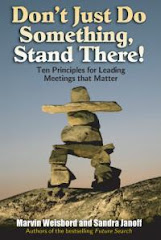A friend said he wanted to recommend Future Search (our collaborative planning process) for team-building with a 15-person work group.
Here's our reply--
Sandra and I are delighted you want to recommend FS for this purpose. However, what we would like you to tell these folks is that although their meeting cannot be an actual Future Search, the techniques used in Future Search (e.g. mind map, time lines) could be useful team-building tools.
You also could point out that two of the four FS principles can be used successfully in team-building: (3) focus on the future/ common ground (problems and conflicts as information, not action agendas); and (4) self-managing their own small group discussions, generating their own data, and drawing their own conclusions. (If they use an outside consultant, they would need somebody who knows how to work this way, rather than a consultant who interviews and organizes the data for them.)
The first two principles would NOT apply, thus making it impossible to do an FS. You will not have (1) the "whole system in the room," since those who constitute the team's environment, e.g., customers, suppliers, other functions, are not present. Therefore, you also can't (2) "explore the whole elephant," since you only have the head and the trunk. The first two are the defining principles of FS. They make systems thinking experiential, bringing the environment into the room. System transformation occurs only when you change a system's relationships to the larger system of which it is a part. In team building all you can change are the relationships of team members to each other and to the boss.
--Marv Weisbord
Subscribe to:
Post Comments (Atom)
.jpg)

Hi,
ReplyDeleteThank You Very Much for sharing this helpful informative article here about Team Building.
Nice Work Done!!!